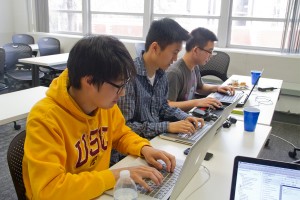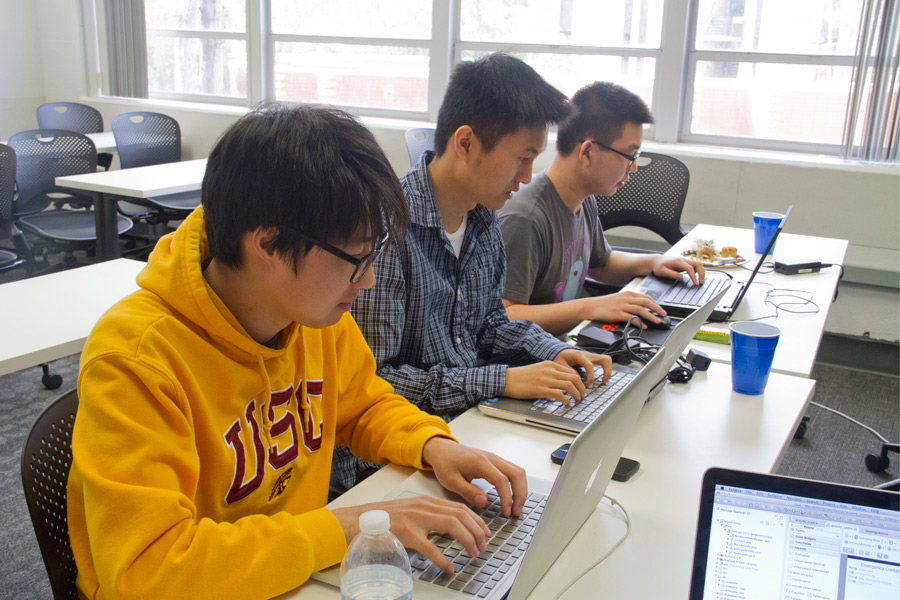Annual hackathon creates technology to help disabled
This past weekend, Project: Possibility, together with the on-campus Association for Computing Machinery, hosted the “SS12 Hackathon: Code for a Cause.”

Techies · (From left to right): Undeclared sophomore Bryan Chong; sophomore Brian Chen, majoring in computer science games and freshman William Yeh, majoring in computer science work on their new software app. – Austin Vogel | Daily Trojan
During the hackathon, undergraduates and graduates developed software projects for disabled persons.
Project: Possibility, a national nonprofit organization, creates software for persons with disabilities. The ACM, a worldwide computing society, serves the computing professional field’s library and research resources. The SS12 raises awareness about issues in accessible computing.
A hackathon does not mean hacking a system — it’s creating something people can use. In the course of a weekend, students can learn a semester’s worth of programming.
“This hackathon, I’m looking forward to helping out my teammates in how to code,” said Ryan Choi, a junior majoring in chemical engineering and nanotechnology. “I’ve learned how to do a lot and I’m looking forward to sharing that experience.”
Wilson Yeh, a freshman majoring in computer science, was excited to be able to give back through his participating in the hackathon.
“It feels really good when everything runs fine and you can say, ‘I made this,’” Yeh said.
SS12 has been held both at USC and at the University of California, Los Angeles through Project: Possibility and the universities’ local organizations, including ACM. In the past, competition winners have created works such as a Braille keyboard for mobile devices and voice-operated chess, according to the SS12.
The hackathon began Friday with a kickoff and introduction. Hackathon participants were allowed 48 hours to create a viable product.
Over the weekend, students worked in Leavey Library, Taper Hall and Grace Ford Salvatori Hall. With breaks only for meals, students coded from 9 a.m. until 10 p.m. on Saturday. Some worked through the night up until Sunday afternoon. On Sunday, the students presented projects to judges at 6 p.m. in eight-minute demonstrations.
Students in one group programmed what happens on each screen of an Android application that allows the visually impaired to play Battleship. They tried to accommodate for unexpected errors in their design, emphasizing large buttons, motion sensor movements and automatic voice response.
“We created a small benefit,” Choi said. “There are not a lot of gaming options for visually impaired people. Most games involve or require visually responsive actions. We’re creating another avenue for gamers.”
Another group created an application for the elderly that detects when a person falls. The projects were geared toward making existing software accessible.
The SS12 empowered students to make a difference through developing software technology.
“[The hackathon competition] makes us realize that when you learn to code, there’s more to it than just technical details,” said Douglass Chen, a sophomore majoring in computer engineering and computer science. “You have to put yourselves in their shoes and think about how it changes their lives. There’s a lot of human connection when you do these kinds of contests.”
ACM awarded several prizes including Logitech software, an LG television screen, a Scrabble board game, a Comfort Curve 3000 keyboard and other miscellaneous items. USC’s winning team will take a trip to the San Diego Annual International Technology and Persons with Disabilities Conference to compete in the United States SS12 Finals with teams from UCLA and California State University, Northridge.
In the future, ACM president Christina Chu hopes to get more beginner programmers to participate in the hackathon.
“We really want to encourage [the hackathon] for newbies and beginners, it may seem really intimidating [at first], to sit down and actually try it, that’s what we’re trying to get people to do,” Chu said.

